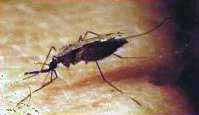Postal address: Institutionen för experimentell medicinsk vetenskap, BMC F:11, SE-221 84 Lund
Visiting address: Sölvegatan 19
Web page: http://www.med.lu.se/english/expmed
Contact person: Professor Lo Persson, phone: +46-(0)46-2227746
The Faculty of Medicine at Lund University has been reorganised. The Division of Molecular and Cellular Physiology is now part of the Department of Experimental Medical Science. The researchers here utilise molecular biological and cell physiological techniques to explore the signal transduction in general and in specialised cell types. The staff consists of three full professors, four post-doctoral fellows, 12 research students and 3 technical assistants divided on three independent groups; one of which is on Polyamines, and is led by Lo Persson and co-workers.
Research connected to South Asia:

 Lo Persson was involved in a major project on ”Structure-based drug development against malaria and leishmaniasis”, in collaboration with research groups headed by Salam Al-Karadaghi, Dept of Molecular Biophysics, Lund University; Olle Heby, Dept of Molecular Biology, Umeå University; and Rentala Madhubala, at the School of Life Sciences, Jawaharlal Nehru University (JNU), New Delhi, India.
Lo Persson was involved in a major project on ”Structure-based drug development against malaria and leishmaniasis”, in collaboration with research groups headed by Salam Al-Karadaghi, Dept of Molecular Biophysics, Lund University; Olle Heby, Dept of Molecular Biology, Umeå University; and Rentala Madhubala, at the School of Life Sciences, Jawaharlal Nehru University (JNU), New Delhi, India.
In November 2002 this project was given a Swedish Research Links (Asian–Swedish research partnership programme) grant on 375 000 SEK for three years (2003-05) by Sida and the Swedish Research Council. See the full list of South Asia related projects that were given grants.
In November 2005 the project got a one-year extension to complete the Swedish Research Links project. More information.
Project description:
This Indo-Swedish co-operation project deals with basic research on certain enzymes prevalent in parasites which cause Malaria and Leishmaniasis (both diseases common in India). The research might result in development of new drugs against these diseases which infect humans living in rural areas of many developing countries, and constitute a major health problem. Estimately 300 to 500 million people are infected around the world. The available chemotherapeutic agents against these diseases are still of relatively low potency and/or high toxicity, and despite much effort very few highly effective drugs have been developed in recent years.
Inhibitors of polyamine biosynthesis exhibit promising effects against other parasitic diseases. With the present project, new approaches involving structure-based drug design and molecular modeling are initiated, aiming at prevention and intervention of leishmaniasis and malaria. Possibilities will be explored that polyamine biosynthetic enzymes and transporters can be inhibited as part of an overall chemotherapeutic strategy, and that the transporters can be deluded to carry toxic polyamine analogs into the parasites.
The project is now compeleted, and no current South Asia related research is carried out within the department (Oct. 2008).